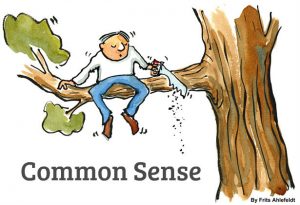Choices change our lives…
By Barbara Dahlgren

There are times in life when we pray and feel God responds instantly. Then there are other times we try to lift our prayers to heaven and feel they get no farther than the ceiling. But that’s okay. Even though we may feel like our prayers aren’t going high enough, they are – because God is always with us. So God always hears our prayers and always answers.
Sometimes He says “yes” and sometimes “no” and sometimes the answer is to “wait awhile.” If the answer is “yes,” we break out into our happy dance. If it’s “no,” we may be disappointed but we adjust. However, I think “wait awhile” can be the most difficult to deal with. No one today wants to wait for anything. We are always in a hurry and we want what we want when we want it. Once I was in such a hurry, I ordered fast food at a drive-through and drove off without my burger.
Today we don’t have to wait for much at all. We can get money when banks are closed through ATMs. If we don’t have money to buy something, we don’t need to wait until we save the money to get it because we have credit cards. We don’t have to wait until we get home for a phone message because our cell phones are always with us. We don’t have to email and wait for a response because we can text. We don’t like to wait. Yet, many time God makes us wait.
The reason might be that what we learn by waiting on God can be just as important as what we are waiting for. If deliverance from a dire situation comes too quickly, we can consider it coincidence, good timing, or the result of our own ability. When we have to wait for something, we usually appreciate it a little more. Waiting is a “building block” of life. It builds our character, builds our patience, and builds our dependency on God.
Many in the Bible had to wait. Abraham and Sarah waited for Isaac’s birth. Noah waited for the flood. Moses waited to get out of the wilderness. Joseph waited to get out of prison. Job waited for deliverance. David waited to become king. We are now waiting for Christ’s return.
Before Christ ascended into the clouds, He told the apostles to go to Jerusalem and wait for the Holy Spirit. He said to “tarry until” they were endued with it. Tarry is just another word for wait. God could have had the Holy Spirit given to them instantly, but He chose to have them wait (Acts 1:1-5). They walked all day to get to Jerusalem from the Mount of Olives (Acts 4:12). They all went into an upper room – along with other followers – 120 in total (Acts 4:13-15). All waited for the promised Holy Spirit.
While they were waiting, they spent their time wisely. They prayed (Acts 4:14). They studied the Scriptures (Acts 4:15-20). They continued God’s work (Acts 4:21-26). They were not idle.
Isaiah 40:31 tells us what happens to those who wait on the Lord. God renews their strength. They run but don’t get weary. They walk and don’t get faint. This shows they must be active. They are moving – running and walking – not just sitting around moping. Waiting on God does not mean sitting around doing nothing, sulking, and feeling sorry for ourselves. Waiting is doing what we are supposed to do: praying, studying, and doing God’s will (Psalm 37:34). Waiting on God builds patience, trust, and faith.
This waiting not only applies to our lives but the lives of others we are praying for. Instead of waiting for God to deliver them, sometimes we want to deliver them ourselves. Oswald Chambers puts it this way: “Are we playing the role of amateur providence, trying to play God’s role in the lives of others? Are we so noisy in our instruction of other people that God cannot get near them? We must learn to keep our mouths shut and our spirits alert.”
Consider this…Not only are we waiting on God, we are waiting with God. He is with us every step of the way. We are not alone in our wait. While we wait, we need to stay focused on God so we don’t grow weary (Galatians 6:9). It’s our relationship with Him that gives us strength and courage (Psalm 61:1).
One final thought… I love what Psalm 62:1 says. “Truly my soul waits on God: from Him comes my salvation.”




















